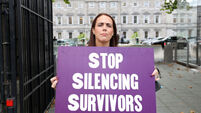Jennie's law puts onus on abused to act

David Poole holds a framed photo of his murdered sister, Jennifer, after Gavin Murphy received a life sentence for her murder in April 2021. Jennie’s Law is a major triumph for the family of Jennifer Poole and the campaigners who fought tirelessly to ensure her death would not be in vain. File photo: Collins Courts
When I was asked to write a response to Jennie’s Law, I took time to think.
As a survivor leading Survivors Informing Service and Institutions (SiSi), an organisation focused on survivors’ experiences of intimate partner violence, I know gut instinct can be a life-saving defence. Yet that same instinct — to report abuse or seek justice — can be turned against survivors when abusers weaponise the law to continue control post-separation.
















